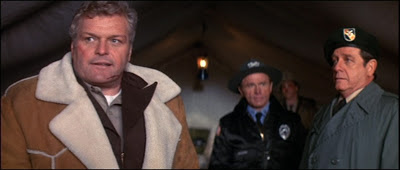I still remember watching the movie First Blood for the first time when I was a kid. It was sometime during the Alpha Male era that dominated the 80's movie theaters. Although there was a plethora of steroids juiced up heroes to pick from, I have to admit that as a child, I always had a soft spot for John J Rambo. The scenes of the Sheriff trying to kick him out of the town, his visions during the jail scenes, and the ending scene when he is claiming to Colonel Trautman that he used to be someone in Vietnam but that now he couldn't even hold a job as a parking attendant dig deep into my subconscious. First Blood Movie Poster
At that age, I didn't understand the concept of war. But if there was one thing that I could easily find at the time in my scarce family, family of friends, neighbors, etc It was veterans of the Vietnam war. Sadly, I can say that many of the things I saw and heard Rambo complain about during the movie, I had witnessed myself. Veterans falling prey of drug abuse. Being kicked out of their homes by their families due to their frustration on knowing how to deal with their traumas. So many of them getting sick of what eventually would be cancer and practically wasting away. To summarize, this was a movie and a main character that hit home for me.
But this is a review of the First Blood book, not the movie. David Morell's book was published ten years earlier before the Stallone's infamous movie came out, 1972. This was basically a full three years before the end of the Vietnam war, the war Rambo is a Veteran of. Just like in the movie, the book opens up with Rambo about to cross the town of Madison, Kentucky, when he is intercepted by the town's Sheriff who ends up dropping him off on the other side of town. Teasle, the Sheriff, tells him he doesn't want the likes of him in the town since it can become an open invitation for other vagrants. This results in Rambo turning around to go back to town and the Sheriff arresting him for vagrancy.
Basically, this is where the similarities between the book and the movie find a pitch fork in the road. In the book, we are provided with a more in depth look at the Sheriff's state of mind when he decides to challenge and to a certain state even harass Rambo. He is preparing to what seems to be an eventual divorce, witnesses the death of his men under his watch, and even his foster parent. At the same time, we also get to witness a Rambo that when pushed to the edge, did not hesitate to hold back. The book version of Rambo makes Stallone's version look like a tepid Teddy Bear. While in the movie we see a Rambo who apologized and tried to surrender when he accidentally killed the deputy that was shooting at him from the chopper, in the book we see a Rambo that shows no remorse after each kill, doesn't know when to give up, just like the Sheriff, and has become a danger to himself and others.
As a fan of the movie, I have to admit that I had a copy of the book on my bookshelf for years but didn't read it until this class. After reading it, I have to wonder what was the marketability for this book back in 1972. If I had to answer that question based on my knowledge of the movie I would say that the movie is a cautionary tale that we have to take care of our Veterans. That we have to invest in their health care and benefits just like they invested in defending our country. But when I try to explain the marketability for the book, I'm not sure if that applies. I dreaded the Rambo version we got in the book. Not because is darker, but because in my opinion is one that shows that there was never hope for Rambo. No hope, no future, society entirely failed him, the institutions that were supposed to support him abandoned him, and in the end, those same institutions are the ones that eliminated him. And the clear representation of that is by being Trautman himself the one who pulls the trigger in the end.
Unfortunately, maybe that is the most accurate representation that our Vietnam Veterans had of the support they received from their government and country when they were returning from Vietnam back in the 70's. If that is the case, I just hope we have learn our lesson, and things have changed for the best. I liked David Morrell's original book and story...I'm just happy I found the movie version first and that it was that Rambo the one I grew up with.





Was the movie really that infamous? I have no real reference for it. I hadn't thought about how the book could be used to represent Vietnam veterans. I also didn't realize that the book and movie were different with their endings, and it was really a sucker punch to see all that Rambo went through just for him to die like that. I enjoyed the book up until the ending, the deaths just didn't feel long enough like it just happened too fast.
ReplyDeleteI agree the death scenes were a little short. However, I actually think the book dragged out the chase a bit too long at points. And maybe that's what made it so much more depressing than the movie would be. It's a slow, inevitable death for both main characters that by the end they're both literally and metaphorically limping along. It did make me feel like there was no true hope in the story.
ReplyDelete